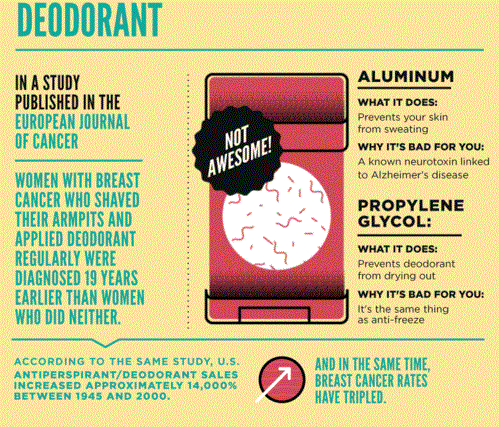Body odor is a concern for all of us; it’s embarrassing to cause a stink on a warm summer day. But there might be an elevated risk that deodorant and cancer, as well as Alzheimer’s disease, are linked. Ingredients like aluminum, parabens, and propylene glycol may slowly be poisoning us. So maybe it’s worth considering a change in how we prevent body odor. deodorant and cancer
Alzheimer’s, Deodorant, and Cancer
Pick up just about any antiperspirant at a drugstore, and it will contain aluminum. For years, these products have used aluminum as a way to reduce underarm moisture, because the metal plugs up sweat ducts. Although studies suggest a link between the aluminum in deodorant and cancer, as well as Alzheimer’s, many brands still use aluminum in their products. Unfortunately, what’s good for business is not necessarily good for you.
Many alternative health proponents regularly speak out against the use of deodorants and antiperspirants that contain aluminum. The link between these products and Alzheimer’s disease has been a subject of much debate in the medical community; for every study that claims there is no correlation between the two, there is another study that does, in fact, suggest a relationship between products that contain aluminum and Alzheimer’s.
For example, the Agency for Toxic Substances & Disease Registry states in its Public Health Statement for Aluminum, published September 2008, that some studies show a link between high levels of aluminum and the development of Alzheimer’s disease. deodorant and cancer
Breast cancer is also a concern. The National Cancer Institute states that there is “no conclusive research” linking breast cancer to the use of commercial deodorants and antiperspirants. But in virtually the same breath, its website states that there does appear to be a relationship of some sort, thanks to studies that “provide conflicting results.”
A 2003 study published in the European Journal of Cancer Prevention found that “frequency and earlier onset of antiperspirant/deodorant usage with underarm shaving were associated with an earlier age of breast cancer diagnosis.” The study concluded that the combination of underarm shaving with the use of these products may contribute to earlier breast cancer occurrence.
Here is an excellent infographic from Goddess Green illustrating the research linking deodorant and cancer and deodorant and Alzheimer’s: deodorant and cancer
Despite the fact that other factors – including the use of oral contraceptives and a patient’s family history – have been proved to play a larger role in the occurrence of breast cancer, the mere fact that studies conflict suggests that we might be better off without this substance under our arms. It’s also important to consider that aluminum is classified as a “heavy metal” because it is known to be toxic to humans in large doses. In short, if we regularly use antiperspirant products that contain aluminum, we are potentially poisoning ourselves slowly over a long period of time.
The debate over the use of aluminum in body products brings to mind the ancient Egyptians, arguably one of the most advanced civilizations in history. They were only one of several advanced civilizations that used lead-based makeup on a regular basis because they didn’t know any better. If we only had to be concerned about aluminum, we might have an easier time finding deodorant that’s healthy for us, but this metal is not the only questionable ingredient in such products. deodorant and cancer
For a transformative alternative to toxic deodorants, check out 3rd Rock ODORBlock:
Properties of Parabens
Parabens are found in many skin-care products, not only in makeup and sunscreen, but also in some deodorants and antiperspirants. Parabens help keep bacteria from growing, and are used as a preservative. According to Cancer.org, the intake of parabens is a concern because studies have shown they have the ability to mimic estrogen (a hormone known to play a role in the development of breast cancer).
Antiperspirant or Antifreeze?
The Centers for Disease Control and Prevention states that propylene glycol, a common ingredient in deodorants and antiperspirants, can adversely affect the renal system (kidneys), the respiratory system, and the skin. Although the Food and Drug Administration has classified propylene glycol as “generally recognized as safe,” its use as an ingredient in antifreeze is worth noting. In large doses, propylene glycol can damage the central nervous system.
Other substances in deodorants and antiperspirants are also a concern. Phthalates, for example, which are used to help ingredients dissolve in order to maintain consistency, have been linked to birth defects and may disrupt hormone receptors. Millions of cells within the human body are born and die each day, but according to Keep a Breast and the Environmental Working Group, phthalates can trigger “death-inducing” signals in testicular cells, causing normal cell death to accelerate. Thyroid problems, obesity, and diabetes are also associated with phthalates.
What’s more, triclosan, which is classified as a pesticide by the FDA, has recently come under fire from the Canadian Environmental Law Association and the state of Minnesota, which banned its use in antibacterial products. Although these concerns focus on the use of triclosan in soaps — and its subsequent presence in area waterways — the chemical is also found in some antiperspirants and deodorants.
Robbing the Body of its Natural Processes
Another concern for consumers is the disruption of the body’s natural detoxification process through the use of antiperspirants. When you use a product that intentionally slows the release of sweat, toxins — including metals like aluminum — are forced to remain in the body. Considering the proximity of the breasts to the underarms, it may not be the healthiest thing to block toxins from escaping the region; indeed, perhaps the link between deodorant and cancer is that deodorant prevents the body from shedding waste that causes malignant cell mutations. deodorant and cancer
Watch this video from HuffPost Live to learn some little-known facts about deodorants and cancer.

Megan Winkler, is an independent writer from Dallas, Texas. She spends her mornings meditating and studying, her days writing for various websites and publishers, and her evenings sipping tea and laughing with friends and family. Her own journey through health challenges has led her to dive into the world of wellness in search of better ways to eat, play, and live. Her undergraduate studies in psychology and master’s degree in military history inform her perspective on how humans interact, relate, communicate and get along in life.
Submit your story or essay to Buzzworthy Blogs. deodorant and cancer






Comments are closed.